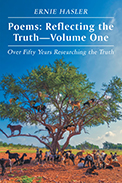
 |
Poems: Reflecting the Truth—Volume One: Over Fifty Years Researching the Truth
by Ernie Hasler
AuthorHouse UK
Destroying the lungs of the earth with tarmac and cement."
Among other topics, Hasler’s poetry emphasizes nature’s blessings that the creator has given humanity and how mankind is obliterating those resources. The poems, written in narrative form and primarily free verse, shed light on the troubling direction of our climate. As the first advisor in Scotland to gain the NEBOSH diploma in environmental management, Hasler’s passion for the globe’s health is undeniable.
Hasler weaves nature poems like “Planet Blue” and “Green Plants” with those referencing God such as “Creation.” In the former, he highlights the water cycle as a miracle from nature and compares its seemingly never-ending cyclical quality to life itself. In contrast, “Creation” sets up a clash between nature, God’s gift to humanity, and nurture, which yields mankind’s selfishness and a crumbling environment. As someone who created his own charity, Plant Tree Save Planet, and mostly self-funded the planting of 20,400 seedlings in 2016, Hasler’s genuine concern for his world and the dangers it faces is expressed with authenticity in “Like Lemmings, We Commit Suicide.” His words paint a grim picture of the future: mankind has run humanity into the ground, and the world is run by robots.
Aside from nature, several poems offer raw emotion. In particular, “Old friends” conjures nostalgic memories of a more active time, of friendships and discussions. Possibly the most intriguing, non-climate related poem is “Awkward Child,” a heartbreaking plea from a child to return his mother from the grips of alcoholism and a condemnation of the Scottish Whisky Association and minimum pricing. Hasler rounds out topics of imbalance of power, the power of media, and future wars with a final poem dedicated to imparting seventy-five years of wisdom. Overall, Hasler’s poetry is pertinent to the time and an authentic, meaningful experience.